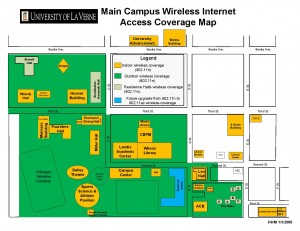The University of La Verne recognizes that every year, faculty and staff are bringing more and more devices to campus, all of which are simultaneously vying for access to the campus wireless network. In preparation for the anticipated increase in wireless bandwidth usage, the Office of Information Technology is beginning a major upgrade to the campus wireless network in all campus buildings on the Main Campus, all ROC Campuses (except for military campuses) and the College of Law and Public Service.
The project will address the ever-increasing need for Internet bandwidth due to the continued influx of wireless electronics such as smart phones, laptops, tablets and other handheld devices on campus. At peak times there are up to three times the amount of wireless devices on the University campus from just four years ago.
Set to be completed campus wide by summer 2016, this effort will make several additions and improvements to the University’s wireless system. Infrastructure will be serviced and replaced. New equipment will be added, and a significant amount of equipment will be upgraded. Areas on campus with spotty coverage will be brought up to new standards, and wireless services will be provided where coverage does not yet exist. Upgrading the network will involve the relocation, replacement and addition of wireless access points and other equipment at the University.
Upgrading and expanding wireless coverage across the University of La Verne will ensure students, faculty and staff have the connectivity they need to continue teaching, learning and researching by filling coverage gaps in areas with substandard or no wireless coverage, replacing incompatible or outdated equipment and managing exponential growth of wireless devices at the University into the future.
Three Phase Project:
This upgrade will be completed in three phases. The information below will explain each phase and provide specific information for clarity.
Phase I: Infrastructure Access- 2 Layers of Deployment
Initially, the wireless upgrade will begin by upgrading network switches and Power over Ethernet (PoE). PoE provides electrical power to a wireless access point over the existing network cable, eliminating the need for a separate power cable. The latest wireless access points require more power to operate and the University will be upgrading from the PoE to PoE+ standard to meet the increased power requirements. The second part of Phase I intends to accommodate the new 802.11ac wireless radio requirements by upgrading the network switch ports from 100 megabits per second (Mbps) to 1000 Mbps.
Phase II: Second Generation Clean Access Engine Upgrade
Phase II of the Wireless Upgrade Project will improve the Cisco Clean Access engine. This process will produce a more secure and clean network environment. This network control system will have the ability to check wireless devices for viruses, malware and undesired software to keep the University’s network as secure as possible and will be implemented on Main Campus, College of Law and Public Service and all ROC Campuses (except for military campuses).
Phase III: Deploying Wireless Access Points
Phase III of the project will install new access points that will serve Main Campus, College of Law and Public Service and all ROC Campuses excluding the military bases. The new wireless access point standard (IEEE 802.11ac) will allow all users at the University of La Verne to access information faster and with better coverage via wireless devices such as mobile phones, laptop computers, and tablet computers. This upgrade will create increased Wi-Fi data rates, capacity, and coverage for a better web experience.
University Deployment:
Deployment will begin in our residence halls–but before we begin, the Office of Information Technology will be coordinating plans with the Housing Department on campus. This step is being taken to be sure that all our residence needs are tended to and to be sure that our offices are mindful of the logistics of our student population.
Deployment Schedule:
Below are a configuration map and a preliminary schedule for campus deployment.
I. Residence Halls
| Location | Status |
| Vista La Verne | Planning |
| The Oaks | Planning |
| Brandt Hall | Planning |
| Stu-Han | Planning |
II. Main Campus Buildings
| Buildings | Status |
| 2215 E Street | Planning |
| Abraham Campus Center | Planning |
| Arts & Communication | Planning |
| Barkley | Planning |
| Barkley Annex | Planning |
| Bonita Building | Planning |
| Center for the Advancement of Faculty Excellence | Planning |
| Central Services East | Planning |
| Central Services West | Planning |
| Chapel | Planning |
| College of Business | Planning |
| Dailey Theater | Planning |
| Davenport Dining | Planning |
| E Street Building-2180 3rd Street | Planning |
| Founders Hall | Planning |
| Graduate Academic Services | Planning |
| Hanawalt Fitness Center | Planning |
| Hanawalt House | Planning |
| Health Services | Planning |
| Hoover | Planning |
| Landis Academic Center | Planning |
| Leo Hall | Planning |
| Lordsburg Building | Planning |
| Mainiero Hall | Planning |
| Miller Hall | Planning |
| Modular Classroom | Planning |
| Music Annex | Planning |
| Sports Science & Athletic Pavilion | Planning |
| University Advancement | Planning |
| Wilson Library | Planning |
| Woody Hall | Planning |
Phase III
- College of Law
Phase IV
| CCC- Central Coast Regional Campus- San Luis Obispo | Planning |
| HDV- High Desert Regional Campus-Victorville | Planning |
| IEC-Inland Empire Regional Campus-Ontario | Planning |
| KCC-Kern County Regional Campus-Bakersfield | Planning |
| OCC-Orange County Regional Campus-Irvine | Planning |
| SFVC- San Fernando Valley Regional Campus- Burbank | Planning |
| VCC- Ventura County Regional Campus- Oxnard | Planning |
| Point Mugu Campus | Not planned |
| Vandenburg Campus | Not planned |
